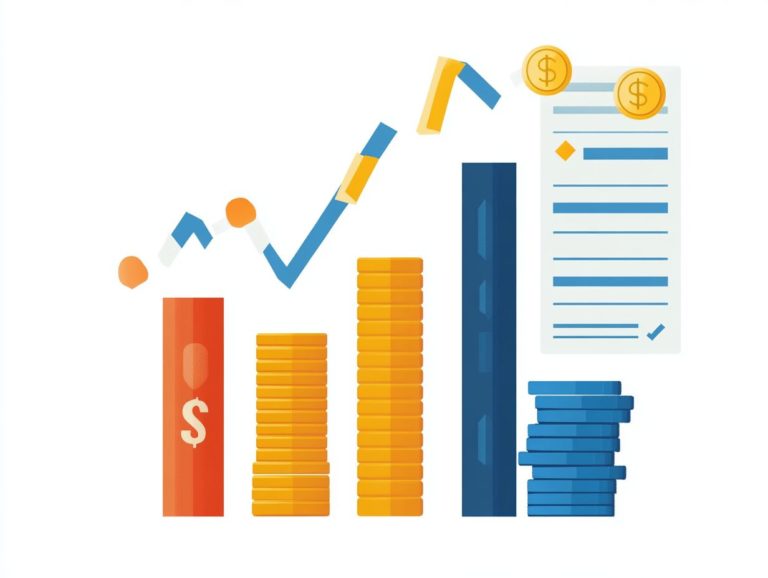Understanding the Value of PMP Certification
PMP Certification, or Project Management Professional Certification, is an esteemed credential that showcases your expertise and dedication to the project management sphere.
If you’re aiming to elevate your career, increase your earning potential, or refine your skill set, obtaining this certification can significantly broaden your opportunities.
This article delves into the advantages of PMP Certification, outlines the requirements you must fulfill, and guides you through the application and exam process.
You’ll discover how to maintain your certification to ensure you remain relevant in this constantly evolving field.
Discover how this prestigious credential can transform your career!
Contents
Key Takeaways:

- PMP certification can lead to career advancement opportunities by demonstrating knowledge and skills in project management.
- Obtaining a PMP certification can increase earning potential, with certified professionals earning 20% more than non-certified professionals on average.
- Maintaining PMP certification requires ongoing education, ensuring that certified professionals stay up-to-date with the latest practices and developments in project management.
What is PMP Certification?
PMP Certification, awarded by the Project Management Institute (PMI), is your ticket to a globally recognized credential for Project Management Professionals (PMPs). It encapsulates the core principles of project management as outlined in a guide that outlines the best practices in project management.
This certification validates your expertise and knowledge in effectively managing projects, making it a prized asset for those looking to advance their careers and gain recognition in the field.
The importance of this certification goes beyond mere personal achievement; this certification demonstrates your commitment to excellence in project management practices.
In a world that increasingly relies on structured methodologies to tackle complex projects, having PMP Certification signals to employers and clients that you are well-versed in industry standards and best practices.
The rigorous preparation involved doesn t just enhance your critical skills; it also opens up global opportunities, making you a more competitive force in the job market.
Familiarity with PMBOK provides you with a roadmap to navigate the intricacies of project lifecycles, ultimately leading to successful project delivery and boosting your organization s reputation.
Benefits of PMP Certification
The advantages of obtaining PMP certification go well beyond simply possessing a title. This achievement opens the door to enriched project management opportunities and delivers meaningful business benefits. To understand how to start, check out what is the PMP certification process, which offers a noteworthy enhancement in both your professional development and project management skills.
Career Advancement Opportunities
PMP certification opens a world of career advancement opportunities for you as a project management professional. It positions you as a standout candidate in a competitive job market and significantly enhances your employment prospects.
This prestigious certification can be a true game-changer. It paves the way for attractive promotions and new job offers that come with increased responsibilities.
For example, a project manager who earned their PMP experienced a remarkable surge in leadership roles just months after certification. This ultimately led to an executive position overseeing multiple projects.
Another individual shared how their PMP credential facilitated a transition from a mid-level coordinator to a senior project manager role at a Fortune 500 company. This emphasizes the impact of this certification on bolstering professional credibility and authority.
These testimonials underscore that the PMP not only equips you with essential skills but also unlocks doors to lucrative positions and advanced responsibilities in your career.
Ready to elevate your career with PMP Certification? Start your journey today!
Increased Earning Potential

Pursuing PMP certification can significantly boost your salary. Project management salary surveys show that certified PMPs often earn much more than their non-certified peers.
Studies suggest that the average salary for PMP-certified professionals can exceed their non-certified counterparts by 20-30% annually. This financial incentive drives many project managers to seek certification, not just for prestige but for enhanced marketability.
Employers value the critical project management skills that certified professionals possess. Understanding why employers value certified project managers can highlight the benefits of investing in PMP certification, which opens the door to greater opportunities and higher earnings.
Requirements for PMP Certification
To get PMP certification, you need to meet specific educational and professional experience requirements. This ensures that only prepared candidates earn this respected credential.
Educational and Professional Experience
Candidates should have a mix of education and experience in project management. A degree in project management or a related field is essential, along with hands-on leadership experience on project teams.
This combination provides you with a solid understanding of project management and practical insights for real-world application. If you hold a Bachelor s or Master s in business administration or engineering, you re in a strong position, especially with significant project management experience.
Taking project management training courses can further enhance your skills. These courses offer strategies and tools applicable across various project environments.
As you build your experience and education, you ll closely align with PMI s certification criteria, boosting your career prospects.
Exam Preparation and Study Tips
Preparing for the PMP exam requires a strategic mix of education and study resources. Use study guides, online courses, and practice exams to improve your understanding of key concepts in the PMBOK.
Creating a structured study schedule, using flashcards, and joining study groups can enhance your study sessions. Engaging with simulation exams can help identify weak areas and build your confidence for test day.
How to Obtain PMP Certification

The path to PMP certification begins with submitting your application, detailing your professional experience. Next, prepare thoroughly for the PMP certification exam to set yourself up for success.
Application Process and Exam Details
The application process for PMP certification requires meticulous attention to detail and careful documentation of your project management experience. This is essential for qualifying to sit for the certification exam.
To kick things off, you need to fill out the application form thoroughly. Outline your project management roles and responsibilities. You ll also need to submit documents, including proof of your education and a record of your project management hours.
Once your application is approved, you can expect detailed instructions about the exam format. It typically features multiple-choice questions covering a range of topics within project management principles.
Leveraging resources such as study guides, online courses, and practice exams can significantly boost your preparedness for the certification test. These resources offer valuable insights into the content and types of questions you ll encounter on exam day.
Maintaining PMP Certification
Keeping your PMP certification is vital for advancing your career! It requires adherence to continuing education requirements, ensuring you stay updated on the latest trends and practices in project management.
By committing to ongoing learning, you enhance your expertise and position yourself as a leader in the field.
Continuing Education Requirements
Continuing education is essential for maintaining your PMP certification. You need to earn a specific number of Professional Development Units (PDUs), which are credits that show ongoing learning in project management.
You have a wealth of options at your disposal. These include interactive workshops for hands-on learning and engaging webinars you can join from home. Comprehensive courses further deepen your understanding of project management principles.
Each format comes with unique benefits, catering to your learning preferences and schedule. By actively participating in these programs, you stay current with industry trends and enhance your skills, ensuring you meet the ever-evolving demands of your role.
Don t miss out! Ongoing learning is essential to keep your certification and stay ahead in this fast-paced field.
Frequently Asked Questions
Here are some common questions about PMP certification:

What is PMP Certification and why is it valuable?
PMP stands for Project Management Professional, and it is a globally recognized certification for project managers. It demonstrates that the individual has the necessary knowledge and skills to successfully lead and manage projects. This certification is highly valued by employers as it sets a standard for project management excellence.
How does PMP Certification benefit my career?
PMP Certification can benefit your career in several ways. It opens up job opportunities in different industries, enhances your earning potential, and provides a competitive edge in the job market. It also allows you to network with other certified project managers and access valuable resources and opportunities for professional development.
What are the eligibility requirements for PMP Certification?
The eligibility requirements for PMP Certification include a secondary degree (high school diploma, associate’s degree, or global equivalent), at least 35 hours of project management education, and 7,500 hours of project management experience. Alternatively, individuals with a four-year degree or higher need 4,500 hours of project management experience to be eligible for the certification.
How is the PMP Certification exam structured?
The PMP Certification exam consists of 200 multiple-choice questions and must be completed within 4 hours. These questions are based on the Project Management Body of Knowledge (PMBOK) Guide, which covers project management processes, tools, and techniques. The exam is computer-based and can be taken at a designated testing center.
Is PMP Certification worth the time and cost?
Obtaining PMP Certification requires a significant investment of time and money, so it is natural to question its value. However, remember that this certification is internationally recognized and has a high return on investment. Understanding the value of PMP renewal requirements can further enhance your career prospects, leading to better job opportunities and higher salaries, making it a worthwhile investment in your career.
How can I prepare for the PMP Certification exam?
Ready to ace your PMP Certification exam? Let s get started!
Join a training course and study the PMBOK Guide. Taking practice exams will help you understand what the test looks like.
Joining study groups can be beneficial. You can also seek advice from certified project managers to enhance your preparation.





